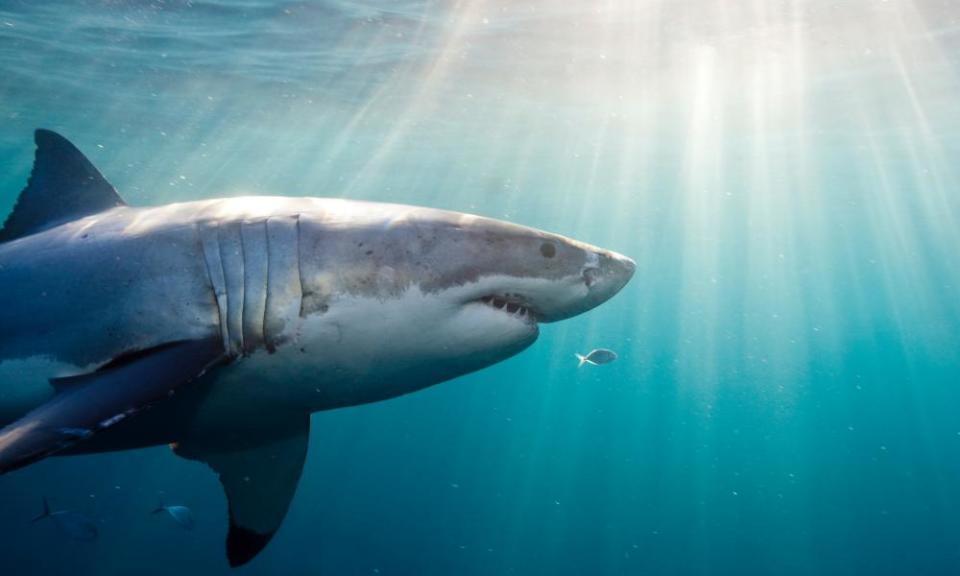Six of the 10 unprovoked shark attack deaths last year were in Australia

Unprovoked shark bites killed 10 people around the world in 2020 with six of the deaths in Australian waters, according to international figures.
The number of unprovoked shark bites and encounters in Australia was only slightly above average, with 18 incidents recorded by the University of Florida’s International Shark Attack File (Isaf). The average over the last five years is 16.
The 10 deaths from shark bites globally was higher than the average of four but the 57 confirmed unprovoked shark encounters was well below the five-year average of 80.
Related: Shark tourism and conservation off South Africa – in pictures
Dr Gavin Naylor, director of the Florida Program for Shark Research at the university, told the Guardian: “Is it a rotten year for fatalities? Absolutely. It’s terrible, but I’m not calling this a trend.”
The fall in reported bites could be due to Covid-19 lockdowns, a drop in coastal tourism or a delay in work to report them to the file, the report said.
There were eight bites in New South Wales, three in Queensland, five in Western Australia, one in Victoria and one in South Australia.
Australia’s spike of six deaths was “likely the product of chance”, the report said, as the number of bites was only slightly above average.
For comparison, data from Royal Life Saving Australia shows between July 2019 and June 2020 there were 125 drowning deaths along Australia’s coastline.
Naylor said Australia’s concentrated population and tourism along the coast coupled with comparably higher numbers of large great white sharks meant Australia always had higher numbers of serious incidents.
He said: “You have this higher density of white sharks in western and south-eastern Australia and they can be 13 or 14 feet (four metres) and if they bite someone then it’s often a serious injury.
“The higher the number of people in the water and the larger the animal, the higher the chances [of a serious bite]. But there’s nothing intrinsically nasty about white sharks.”
Related: Australian seafood consumers urged to stop buying flake to protect sharks
Four of Australia’s six deaths in the file were from great white shark bites, the data showed. Of the 18 unprovoked bites where the species could be confirmed, 10 came from great whites, one from a lemon shark and one from a wobbegong.
Naylor said the attack file focused on unprovoked bites. A provoked bite is when humans have interfered with the natural behaviour of the shark, for example through fishing or baiting close by.
Three additional deaths came from provoked bites globally in 2020, the Isaf data says.
The report says: “Annual fluctuations in shark-human interactions are common. Despite 2020’s spike in fatalities, long-term trends show a decreasing number of annual fatalities.
“Year-to-year variability in oceanographic, socioeconomic and meteorological conditions significantly influences the local abundance of sharks and humans in the water.”
Around the world, there were 57 unprovoked shark bites, with the United States recording 33, of which 16 were in Florida.
Aside from Australia and the US, no other country recorded more than one bite in 2020.
Some 61% of bites were either on surfers or people doing board sports, followed by 26% on swimmers, with snorkellers, body surfers and scuba divers making up the rest.
The report said: “Short-term trends still show both fatal and non-fatal bites to be decreasing. The total number of unprovoked shark bites worldwide is extremely low, given the number of people participating in aquatic recreation each year.”
Naylor said he was always impressed by the reaction of most surfers to being bitten.
“Some of these surfers are impressive as they don’t blame the sharks and say they know they’re in the shark’s environment.”
These are Naylor’s centre’s tips to avoid a shark bite:
Don’t go into the water alone
Don’t go in the water at dawn or dusk
Don’t swim where there are lots of fish
Don’t go into the water wearing jewellery that can catch the light
Don’t swim where people are fishing
Avoid splashing at the surface

 Yahoo Finance
Yahoo Finance 